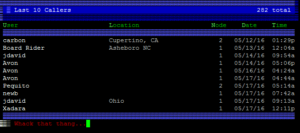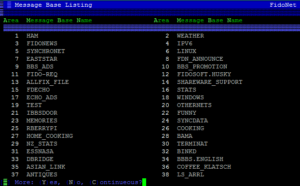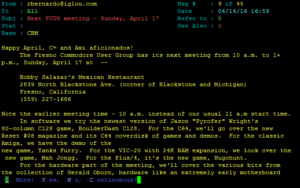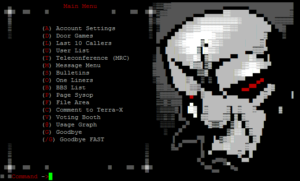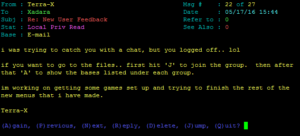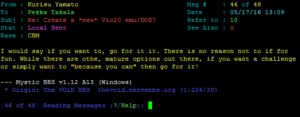Before there was the internet, there were Bulletin Board Systems (BBS for short). These systems were basic, at their core, but could grow quite complex. The way they worked was simple: a user dialed the phone number of the BBS they wanted to access and, presuming the line wasn’t busy, they would connect directly to the computer the other end and be able to leave messages, download files, and, in the case of BBS systems with multiple lines, interact with other active users.
It was the 80’s, and computer systems were primitive by todays standards, but for the time, the ability to just dial a number and leave a message for others to read, all via the computer rather than traditional voice communication, was an amazing thing.
These days though, with the internet, the BBS scene of the 80’s is all but gone. Very few BBSes exist in a dial-up form, of the relatively few BBSes that even exist these days, but that doesn’t mean they aren’t out there. Some, rare ones are still being hosted on that old, classic hardware, but many more have been put into more modern systems – they still use those classic ANSI character sets, low resolution outputs, and classic keyboard only navigation methods of yesteryear, and they are fully accessible from any computer with an internet connection.
The Telnet protocol, something that I always wondered about as a kid, is the primary way these days to access a BBS, should you choose. By going to a particular URL for the BBS, you are treated to a login screen much the same as if you had dialed in to the system. Of course, it runs much faster because you are on a high speed internet connection versus a phone line, but the idea is the same.
Now, amazingly, I had never done this before until the 17th of May, 2016. That’s the moment I suddenly, while watching the BBS documentary produced by Jason Scott, thought about trying one out. I had spent a few days randomly reading up on their history and thought it might be fun to see if any local ones still exist, so, I downloaded a free telnet software, PuTTy, and found the URL for a Memphis based BBS. The only BBS left in Memphis, as best I can find.
I logged in, made an account and found… very little going on. Maybe it was the software used on it, maybe it was me being a novice, but I was not impressed. Undaunted, though, I did a quick search on a BBS database and found one that looked interesting, called The Void.
This was a better choice to jump into. A more easy to understand interface, and connection to Fidonet, which most simply can be understood as a network of BBSes sharing the same message databases; a really useful system for long-distance communication in the pre-internet days (so you didn’t have to dial an expensive long distance number) as well as a nice collection of more broad, worldwide traffic these days.
I must have dialed in 8 times the first day, just checking various things out, exploring, and enjoying the system, even getting into a conversation with the Sysop, or System Operator; the owner of the BBS. A very welcoming guy, to be sure, he wanted to toss over tips on how to access various unique elements of his BBS. That was just awesome.
It may not be the same as it was 30 years ago, but it’s still a BBS. It’s still something other than traditional internet communication. It’s something unique, and a major part of computer history. I’ll probably be writing more about BBSes in the future, as I use them more, and as I get accustomed to the speed at which communications on them operate.

